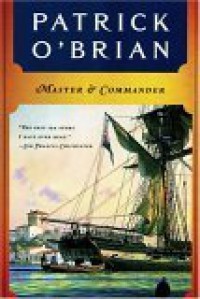Master and Commander
 While author Patrick O'Brian had never been a sailor, he did do a lot of meticulous research about boats and the 19th century British navy. Unfortunately, he felt the need to dump every bit of that research into his debut novel. Instead of picking and choosing which details were relevant, and which could be omitted, he decided to fling every last one into the book.
While author Patrick O'Brian had never been a sailor, he did do a lot of meticulous research about boats and the 19th century British navy. Unfortunately, he felt the need to dump every bit of that research into his debut novel. Instead of picking and choosing which details were relevant, and which could be omitted, he decided to fling every last one into the book. It's the equivalent of a chef with a stocked kitchen throwing all his ingredients and spices into a giant pot.
The result is a deathly boring work. Of the book's roughly 450 pages, well over half are spent on minutiae. And most of those are spent cataloging every aspect of a ship, from the precise nature of the hull, to its rigging, to the sails, to the first mate's interactions with the purser, etc. These are all presented in the most dry, lifeless manner imaginable. And while it might have been tolerable for perhaps 10 pages, this type of tedious description dominates the entire work. And I'm someone who used to spend hours and hours as a kid reading descriptions of, and looking at pictures of old ships.
However, even those non-fiction books were vastly more interesting than Master and Commander!
In fact, while reading this, I couldn't help comparing it to my favorite sea-faring books, particularly Rafael Sabatini's Captain Blood and various Joseph Conrad novels. Captain Blood didn't feature any of those endless, irrelevant details whatsoever. Instead, it focused on the adventure. It focused on its bold, larger-than-life characters.
Now, while you might dismiss Sabatini's works as being more lighthearted and less serious, what about Conrad? Conrad, after all, was actually a mariner in the British Royal Navy for 16 years! He was the very type of sailor that O'Brian is writing a fictionalized account of.
And yet, Conrad's own works set on ships never go into those little details, either. He too was more interested in the men on board the ships, not trivial details about the exact type of wood used on the hull.
When O'Brian finally gets around to the story itself, it's simplistic, sorely lacking in imagination. Before reading this book, I never would have guessed that a description of one ship defeating another in battle and taking it prisoner could be so utterly boring. I almost feel like the author deserves a prize; I wouldn't have believed it possible before.
And the characters? Forgettable personalities with no distinguishing qualities. Even introducing secret identities and vague conspiracies (the standby of a writer out of creative ideas) couldn't breathe any life into them.
In fact, that's the best way to describe Master and Commander; whether it's regurgitating copious amounts of research, or advancing a cliched, childish plot, it's thoroughly dull and lifeless.


